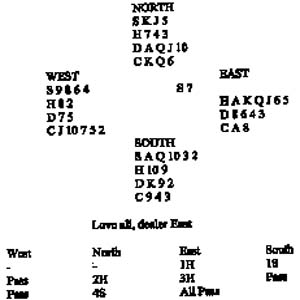|
Bridge
 YOU
are sitting East and partner leads the eight of hearts. You win with
the jack of hearts and continue with the ace, everyone following. What
now? It is fairly obvious to continue with a third top heart, aiming
to promote partner’s trump holding. Declarer ruffs with the ten of
spades and your partner discards the seven of diamonds. Declarer’s
next move is a club to the king. How will you defend from this point?
There is no conceivable reason to duck. Indeed, if you to hold up the
ace declarer will draw trumps and run four diamond drinks for the
contract. Instead you should win with the ace of clubs and play a
fourth round of hearts, deliberately giving a ruff-and-discard.
Declarer cannot afford to ruff in his hand because this would leave
him with one fewer trump than West. He will discard his losing club
and ruff with dummy’s five. Your partner, meanwhile, will throw his
last diamond. When declarer cashes the king and jack of spades, you
will show out on the second round. Knowing that he cannot afford to
overtake, declarer will follow with a low trump and then try to reach
his hand with a diamond to the king. Not today! Your partner will ruff
the first round of diamonds, defeating the contract. YOU
are sitting East and partner leads the eight of hearts. You win with
the jack of hearts and continue with the ace, everyone following. What
now? It is fairly obvious to continue with a third top heart, aiming
to promote partner’s trump holding. Declarer ruffs with the ten of
spades and your partner discards the seven of diamonds. Declarer’s
next move is a club to the king. How will you defend from this point?
There is no conceivable reason to duck. Indeed, if you to hold up the
ace declarer will draw trumps and run four diamond drinks for the
contract. Instead you should win with the ace of clubs and play a
fourth round of hearts, deliberately giving a ruff-and-discard.
Declarer cannot afford to ruff in his hand because this would leave
him with one fewer trump than West. He will discard his losing club
and ruff with dummy’s five. Your partner, meanwhile, will throw his
last diamond. When declarer cashes the king and jack of spades, you
will show out on the second round. Knowing that he cannot afford to
overtake, declarer will follow with a low trump and then try to reach
his hand with a diamond to the king. Not today! Your partner will ruff
the first round of diamonds, defeating the contract.
 What will you say now? What will you say now?
Answer
You have enough for
game, but no idea which game will be best. This is the classic
definition for a bid in the fourth suit — here 2H. Such a bid does
not promise anything in the fourth suit. Indeed, if you were well
stocked there, you would have bid no trumps instead. You ask partner
to continue to describe his hand. No other bid is remotely
satisfactory. For example, 3S shows a six-card suit and invitational
strength.
AWARDS: 2H-10, 3S-4,
3C-3, 4S/3NT-2.
David Bird —
Knight Features
|